|
|
|
Sort Order |
|
|
|
Items / Page
|
|
|
|
|
|
|
| Srl | Item |
| 1 |
ID:
150953
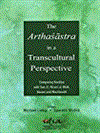

|
|
|
|
|
| Publication |
New Delhi, Pentagon Press, 2017.
|
| Description |
ix, 293p.hbk
|
| Standard Number |
9788182749382
|
|
|
|
|
|
|
|
|
|
|
|
Copies: C:2/I:0,R:0,Q:0
Circulation
| Accession# | Call# | Current Location | Status | Policy | Location |
| 058945 | 181.44/LIE 058945 | Main | On Shelf | General | |
| 058946 | 181.44/LIE 058946 | Main | On Shelf | General | |
|
|
|
|
| 2 |
ID:
167060
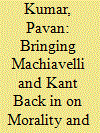

|
|
|
|
|
| Summary/Abstract |
This article is an attempt to understand the idea of morality in two of the most influential philosophers Niccolo Machiavelli (The Prince and Discourses) and Immanuel Kant (Perpetual Peace and Metaphysical Elements of Justice). Machiavelli and Kant are chosen because both of them are the most cherished philosophers in their fields. Machiavelli’s name is associated with realism, and he got a bad name because of his alleged cruel advice to maintain the state. His name is equalled with cunningness, murder, treachery. On the other hand, Kant is the founding figure of idealism in politics. His focus on categorical imperative and human capabilities to attain the higher moral goals made him one of the most well-known philosophers on idealism. To understand the ethical problems of the day emphasis is given to the classic writings of scholars who have written extensively on morality, justice, state, power, human rights and individual freedom. This article is an attempt to answer the following questions: Is the state in itself a highest moral actor? Can there be an individual morality above the state? What should be the yardstick to judge an act—the act in itself or the outcome of the act? What are the duties and rights of the individual in domestic society and can there be a similarity of morality at the level of political leaders in international politics? The paper argues that both Machiavelli and Kant were dealing with different contexts and societies, and morality for them had different meanings. However, the end justifies the means dictum is not the right way to understand Machiavelli on morality.
|
|
|
|
|
|
|
|
|
|
|
|
|
|
|
|
| 3 |
ID:
092118
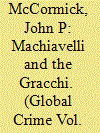

|
|
|
|
|
| Publication |
2009.
|
| Summary/Abstract |
In this article, I highlight a rhetorical strategy in Machiavelli's Discourses through which: (1) the Florentine endorses, despite appearances to the contrary, the redistributive agenda of the Brothers Gracchi, Roman tribunes frequently blamed for causing the collapse of the Republic; and (2) subtly intimates the violent means that other prospective reformers of republics must employ to succeed where the Gracchi had failed. Machiavelli invokes 'prudence' in his passages devoted to the Gracchi; following this lead, I accentuate the form of prudential rhetoric that he practices in such passages, and I point to the prudential form of violence he thought necessary if republics were to, in his words, 'keep the public rich, and the citizens poor'.
|
|
|
|
|
|
|
|
|
|
|
|
|
|
|
|
| 4 |
ID:
086853
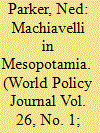

|
|
|
|
|
| Publication |
2009.
|
| Summary/Abstract |
Baghdad, Iraq- The country has gone through hell. The morning explosions, round the clock mortaring, day and night gun battles. The bodies dumped on the periphery of neighborhoods.
|
|
|
|
|
|
|
|
|
|
|
|
|
|
|
|
| 5 |
ID:
090131
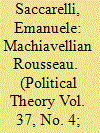

|
|
|
|
|
| Publication |
2009.
|
| Summary/Abstract |
Rousseau's argument concerning gender and family relations in his Discourse on the Origin of Inequality is a Machiavellian one. According to Rousseau, while Machiavelli at first glance seemed to flatter the tyrants, he actually intended to expose their unjust rule. I argue that this original and provocative interpretation of Machiavelli provides a key to Rousseau's own understanding of women as tyrants, and the family as the seat of their rule. My interpretation begins from a number of apparently ambivalent passages found in its Dedication to the Republic of Geneva, and challenges prevailing notions concerning Rousseau's understanding of the masculine reason of the Enlightenment, the character of modern civilization, and the relations of power intersecting the private and public spheres. I also consider the implication of the fact that, although Rousseau attacked what he perceived to be a sinister matriarchy, his arguments have and continues to be appropriated by feminist authors.
|
|
|
|
|
|
|
|
|
|
|
|
|
|
|
|
| 6 |
ID:
115735
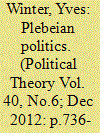

|
|
|
|
|
| Publication |
2012.
|
| Summary/Abstract |
In his Florentine Histories, Machiavelli offers an ambivalent portrayal of the revolt of the textile workers in late fourteenth-century Florence, known as the tumult of the Ciompi. On the face of it, Machiavelli's depiction of the insurgent workers is not exactly flattering. Yet this picture is undermined by a firebrand speech, which Machiavelli invents and attributes to an unnamed leader of the plebeian revolt. I interpret this speech as a radical and egalitarian vector of thought opened up by Machiavelli's text. The revolutionary address reveals an untimely and not entirely self-conscious political radicalism, a plebeian politics that repudiates the logic of oligarchic privilege and is simultaneously not available for subsumption under the mantle of civic republicanism.
|
|
|
|
|
|
|
|
|
|
|
|
|
|
|
|
| 7 |
ID:
149684
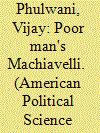

|
|
|
|
|
| Summary/Abstract |
This article presents Saul Alinsky's theory of community organizing as a democratic alternative to political realism's fixation on the coercive authority of the state and the ethical problems of statesmanship. Alinsky shows how the organizer can be used as a paradigmatic political actor in developing an approach to political ethics that treats power and self-interest as ethical concepts on which to construct a radical vision of democratic politics. His “morality of power” consists of learning how to use relational power and thick self-interest to develop democratic forms of deliberation and action. In contrast to the aim of the statesman, the organizer's goal is not simply to acquire power and learn how to wield it: An organizer helps the powerless learn how to use and think about power for themselves. Organizing is realist, pedagogical, and democratic, and Alinsky's ability to hold these ideas together makes him an important theorist of democratic agency in undemocratic times.
|
|
|
|
|
|
|
|
|
|
|
|
|
|
|
|
| 8 |
ID:
043222
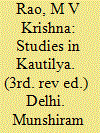

|
|
|
|
|
| Edition |
3rd. rev ed.
|
| Publication |
DelhI, Munshiram Manoharlal Publishers, 1979.
|
| Description |
viii, 171p.
|
|
|
|
|
|
|
|
|
|
|
|
Copies: C:1/I:0,R:0,Q:0
Circulation
| Accession# | Call# | Current Location | Status | Policy | Location |
| 028984 | 320.1/RAO 028984 | Main | On Shelf | General | |
|
|
|
|
| 9 |
ID:
115734
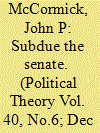

|
|
|
|
|
| Publication |
2012.
|
| Summary/Abstract |
This article analyzes Machiavelli's accounts of the historical figures Agathocles, Clearchus, Appius and Pacuvius to (1) accentuate the Florentine's distinction between tyranny and civic leadership, (2) identify the proper place of elite punishment and popular empowerment in his conception of democratic politics, and (3) criticize contemporary Straussian and "radical" interpreters of Machiavelli for profoundly underestimating the roles that popular judgment and popular rule play within his political thought.
|
|
|
|
|
|
|
|
|
|
|
|
|
|
|
|
| 10 |
ID:
190890
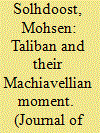

|
|
|
|
|
| Summary/Abstract |
The Taliban 2.0 have made overtures to states across different regions to seek international recognition. In a departure from their past isolationist foreign policy practices, I argue the Taliban have expediently, yet uncharacteristically, pursued these initiatives in a spirit of “pragmatism.” The modus vivendi they have reached with Iran demonstrates the Taliban’s unprecedented prioritization of pragmatism over ideology. I draw upon Machiavellian pragmatism in International Relations theory to examine the shift in the Taliban’s political posture through the lens of Iran–Afghanistan relations in three crucial episodes: the Taliban’s rule over Afghanistan from 1996 to 2001, the post-9/11 Afghanistan, and the resurgence of the Taliban since August 2021.
|
|
|
|
|
|
|
|
|
|
|
|
|
|
|
|
| 11 |
ID:
092119
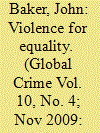

|
|
|
|
|
| Publication |
2009.
|
| Summary/Abstract |
Should radical egalitarians operating in contemporary capitalist democracies use political violence to achieve their aims? Purely consequentialist arguments provide too simple an answer. Machiavelli's perspective is more complex because it contains both consequentialist and non-consequentialist elements and because of its emphasis on the strictly political costs and benefits of violence. The radically egalitarian ideal of equality of condition is similarly complex but involves very different values and objectives. These generate both moral and political arguments against violence. However, the threat of counter-revolutionary violence creates a dilemma for radical egalitarians that it is difficult to resolve.
|
|
|
|
|
|
|
|
|
|
|
|
|
|
|
|
| 12 |
ID:
080820
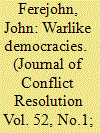

|
|
|
|
|
| Publication |
2008.
|
| Summary/Abstract |
Classical republican theories are monadic in the sense of seeing in each political regime a set of typical operating characteristics. There is disagreement as to what those characteristics are and specifically whether republican governments are more likely to be aggressive or peace loving. We group these two views as (democratic) mobilization theory versus (republican) checks theory and argue, first, that each can help us understand the finer structure of republican government; second, that they are not contradictory but can be combined in various ways in the same institutions; and third, that they offer the prospect of deepening our understanding of what is called the democratic peace proposition.
|
|
|
|
|
|
|
|
|
|
|
|
|
|
|
|
|
|
|
|
|